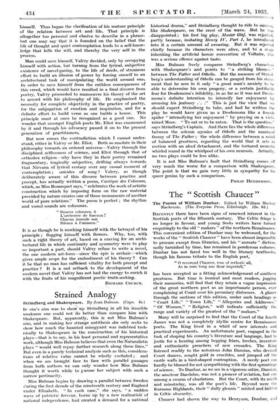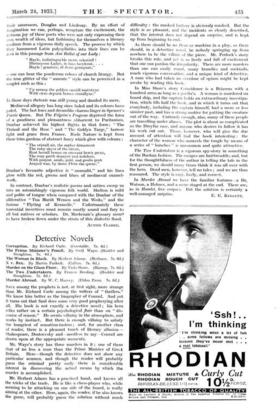The " Scottish Chaucer"
RECENTLY there have been signs of renewed interest in the Scottish poets of the fifteenth century. The Celtic fringe is no longer in favour, and young Scots writers have turned enquiringly to the old " makers " of the northern Renaissance. This convenient edition of Dunbar may be welcomed, for the works of the " Scottish Chaucer" have been almost impossible to procure except from libraries, and his " aureate " diction, sadly tarnished by time, has remained in ponderous volumes. Dunbar has not fared too well in the literary textbooks, though his famous tribute to the English poet, "0 reverend Chaucer, rose of rethoiic. all, As in mire tong ane flour imperiall," has been accepted as a fitting acknowledgement of southern greatness. But time is ironical and most readers, jogging their memories, will find that they retain a vague impression of the great northern poet as an importunate person, ever complaining at Court over his pecuniary distresses. A glance through the sections of this edition, under such headings as "Court Life," "Town Life," "Allegories and Addresses." "Of Women," "Religion," -will indicate sufficiently the range and variety of the greatest of the " makars."
Many will be surprised to find that the Court of the fourth James was not a completely idyllic centre for Renaissance poets. The King lived in a whirl of new interests and practical experiments. An unfortunate poet, engaged in the task of shaping his country's literature and language, had to jostle for a hearing among begging friars, leeches, inventors and enthusiastic preachers of new crusades. The King listened readily to the notorious John Damian, who devised Court dances, sought gold in crucibles, and jumped off the castle walls in a bird-shaped contraption. A needy poet can hardly be blamed for not sympathizing with the first sproutings of science. To Dunbar, as we see in a vigorous satire, Damian, the amateur Daedalus, was not a pioneer of aviation, but one among a swarm of charlatans. But the Court, with its mirth and minstrelsy, was all the poet's life. Beyond were the fearsome Highlands, their" dully glennis " misted and hidden in Celtic obscurity.
Chaucer had shown the way to Henryson, Dunbar, and their successors, Douglas and Lindesay. By an effort of imagination we- can, perhaps, recapture the excitement, the
arduous joy of these poets who were not only expressing their own wealth of ideas, but fashioning for themselves a literary medium from a vigorous daily speech. The process by which they hammered Latin polysyllables into their lines can be seen in this passage from Ane Ballot of our Lady " Hayle, indistinguyble sterre celestiall !
Illumnyous Ladye, in lune lueyferat. . . . Hayle ! genetrix, of Jesse germyna,"
—one can hear the ponderous echoes of church liturgy. But the true glitter of the " aureate " style can be perceived in a
couplet such as this : •
"Up sprang the goldyn candill matutyne With elere depurit heroes cristallyne.
In those days rhetoric was still young and dazzled its users:
Mediaeval allegory has long since faded and its colours have paled, The last hues and dreamlike charms linger in Spenser's Faerie Queen. But The Pilgrim's Progress deprived the form of a gaudiness, and pleasantness abhorrent to Puritanism.
Dunbar achieved his highest flights in that form ; "The Thrissil and the Rose" and " The Goldyn Targe," borrow light and grace from France. Rude Nature is kept from these trim gardens of abstract fancy which glow with colours;
"The eristall air, the sapher firmament The ruby skyes of the orient, Kest beriall bemes on emerant bewis grene, The rosy garth depaynt and redolent, With purpur, azure, gold, and goulis gent Arayed was, by dame Flora the quene."
Dunbar's favourite adjective is " anamalit," and his lines glow with the red, greens and blues of mediaeval enamel- work.
In contrast, Dunbar's realistic poems and satires sweep us into an astonishingly vigorous folk world. Skelton is mild and polite of tongue when compared with the Dunbar of the alliterative " Tua Mariit Wemen and the Wedo," and the furious " Flyting of Kennedie." Unfortunately these
torrential .invectives must remain mostly sound and fury to all but natives or scholars. Dr. Mackenzie's glossary seems to have broken down under the strain of this dialectic flood.
AUSTIN 'CL-4.11KE.







































 Previous page
Previous page